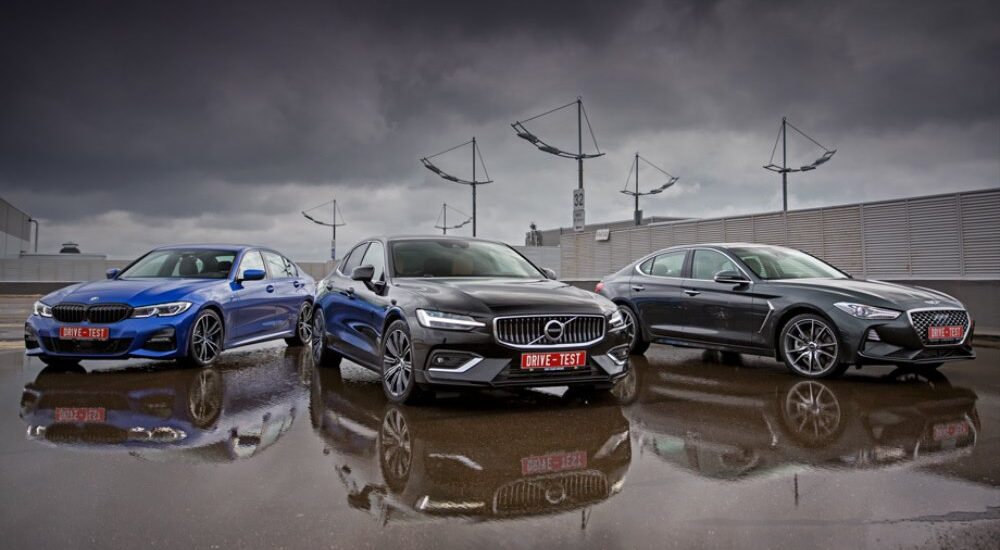Putting the Volvo S60 between the BMW 320d and Genesis G70 sedans
The 190-horsepower T4 should be the most popular version of the latest Volvo S60 sedan. We chose polar rivals for it: the reference premium is the BMW 3 Series, and the commensurate Genesis G70 acts as a relatively affordable alternative. By the beginning of the test, we hadn’t yet had the basic gasoline 320i, so we took the 320d with a conventional chassis and a minimum of options. One problem is the controversial body art-wrapping, under which the car is not visible. Therefore, we use the elegant 330 with an M-package for shooting. And it will also come in handy below when talking about a more “driver” modification of the Volvo.
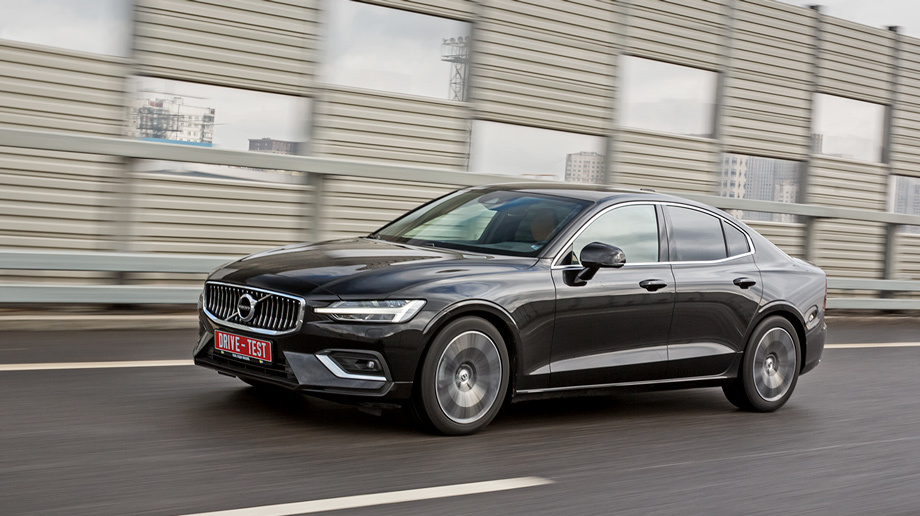
For my taste, the most beautiful version of the “Sixty” is the V60 Cross Country station wagon. Against its background, and in comparison with the BMW or even not the most original Genesis, the black sedan looks rustic, a bit secondary. Only the light pattern of the headlamps is catchy: either two tridents, or the symbols “E3”.. You have to slam the doors sensitively to close them the first time. The interior design is conservative, but the cabin impresses with the quality of materials. Wooden inserts in the front panel don’t require additional payment. Air deflectors are expensive to the touch.

After the inconvenient BMW dashboard, a simple Volvo digital panel pleases with its simplicity and desire to resemble analog scales with needles. It is necessary to get used mainly to the excessive role of the touch screen in the management of secondary functions. The elementary inclusion of seat heating or air recirculation has been turned into at least a two-step procedure that distracts from the road. It’s not safe…

Unlike its classically assembled competitors, the Volvo is based on a front-wheel drive platform with a transversely mounted motor. Apparently, that’s why the Swedish sedan is more spacious than the others. A person taller than 185 cm sits behind the same driver with a small gap at the knees, although resting against the ceiling.
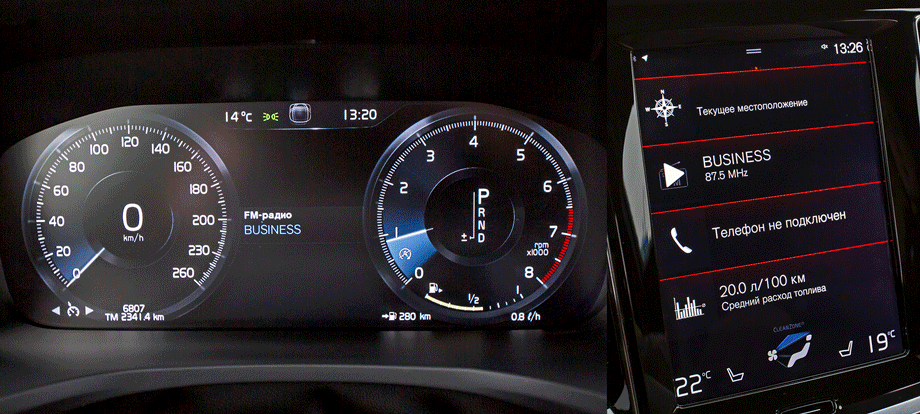
It is more difficult to get into the BMW because of a high sill, and there is also less space – the legs break into the seat back. The Genesis is frankly cramped: there is no room for feet and knees. And the G70’s trunk is a clear loser. Volume, ease of loading through a narrowed opening, cheap trim ― all this is the worst in the trio. The Volvo is in second place due to the lack of a powered boot.
I like how the engine is started in the S60 by turning a knob on the central tunnel. The starter button in the BMW is located in the same place but gets lost among similar ones, and in the G70 it is hidden behind the steering wheel. It’s strange only that the Volvo engine doesn’t turn off when the lever is turned the other way. A mechanical selector of the automatic gearbox with fixed positions may not be fashionable, but with it you are definitely sure which gear is engaged. All three cars are equipped with floor accelerators.

Surprisingly, the S60 drives in a BMW-esque manner. The traction control is precise, and the gear shifts are not too soft. It handles bumps with resilience, replicates short waves, and the body doesn’t sway. The steering noticeably hardens as the speed increases. The reactions to the steering wheel’s turns are quite accurate, only in sharp turns, there is a drop in reactive force. The rolls are minimal. In a word, the driving characteristics lean towards “driver-ness”. However, the Volvo is the noisiest car. On coarse asphalt, noticeable tire noise appears literally from 40 km/h. Are you sure this isn’t a BMW?
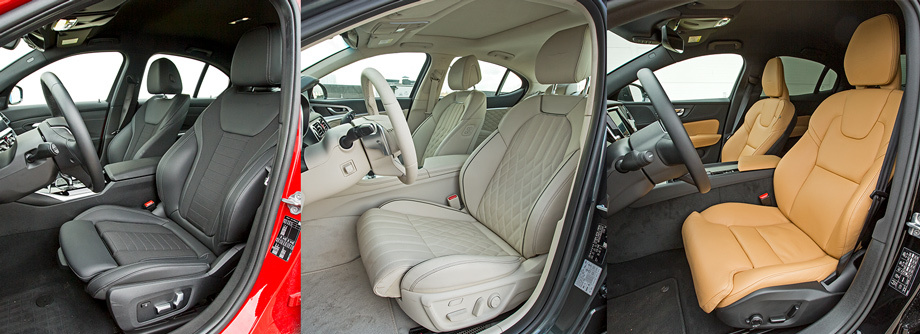
A real, not Swedish-imitated, Bavarian sedan is a delight for the driver. You sit lower in a tight seat, which doesn’t have adjustable lumbar support, but you can narrow the side support rollers on the backrest. This is standard equipment, as is the smaller diameter steering wheel than in the Volvo, with a thicker rim. However, the left elbow feels cramped, and the optional electronic instruments are so inconvenient that they make you recommend ordering a windshield projector. The G70’s graphics and functionality are simpler.

With the same power of 190 hp, the diesel is 100 N•m more torquey than the Volvo turbo four. The only thing you could complain about is a half-second delay in its response at the beginning of the accelerator’s travel. Once it gets going, the BMW 320d surges ahead faster than all, pulled by a strong, quiet traction. The operation of the automatic transmission can’t be called unnoticeable, but the shifts happen more smoothly than in the S60 and G70. If you don’t disable the start/stop system with a button on the tunnel, the diesel shakes on restart as if one of the mounts has gone bad. The braking sensations in the BMW and Volvo are similar: the pedal has a short travel and is resilient.
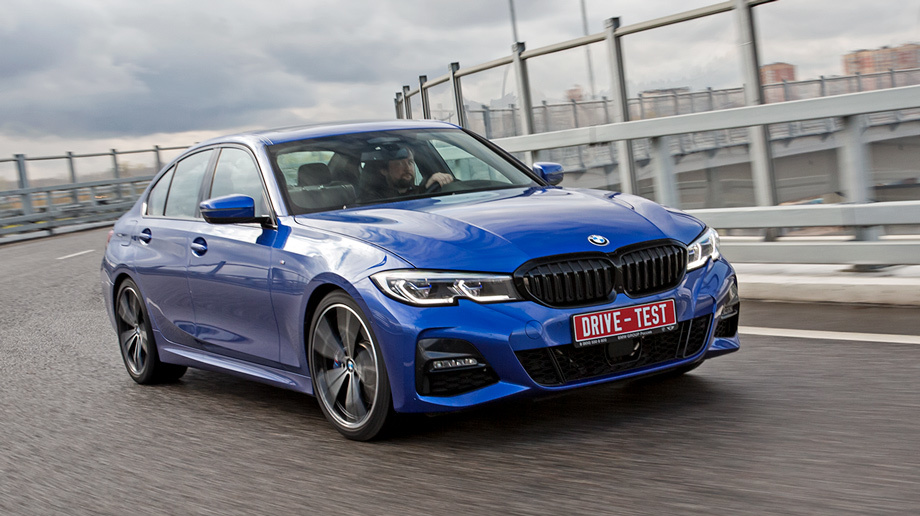
Although the steering wheel completes almost three full turns from end to end, it can’t be called sluggish. And it’s not light either. However, on the 3 Series, it loads up more logically, including in turns. The constant viscosity of the force doesn’t let you feel the beginning of skidding, but it’s still far off. The balance of understeer and oversteer is delicately tuned. However, as expected, more engaging handling comes at the expense of a ride smoothness, which is worse than the S60’s.
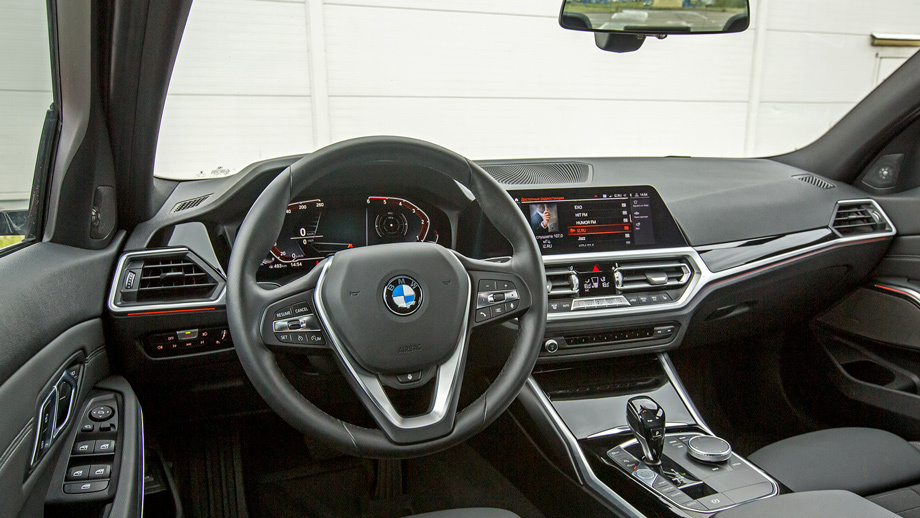
The base suspension with amplitude-dependent shock absorbers is good within its genre. It doesn’t allow excessive pounding on large potholes. The ride is dense, firm, but you can forget about the all-terrain capabilities of the previous 3 Series. The 3 Series also can’t be called quiet, even with optional noise-insulating front windows, as in our case. Sounds from the street are audible, as is the rolling of the only Run Flat tires in the test. However, the main conclusion is this: even the base 320d is harmonious in the role of a sedan with obvious sporty characteristics. As is fitting for a BMW.

The Genesis is presented as a car made outside of the box. Indeed, there are a number of original solutions here. For example, not skimping on finishing chrome, including door handles, the Koreans saved on keyless entry sensors, and installed buttons only at the front. Even in the “base” model, the front panel is finished with artificial leather. But it can’t distract from the cheap silver interior buttons and cold-blue lighting. The metal of the door frames is displayed. But the doors close with a more noble sound than in the Volvo or BMW, where the cheap clatter causes particular bewilderment.

The steering wheel surprises with the primitiveness of the slippery drum controls for the audio system and onboard computer. At the same time, the richly quilted seat allows for a more comfortable seating position than the flat one with a hunched back profile in the Volvo. Moreover, only in the G70 can the seat be ventilated, and the steering column adjusted by electric drive.

The screen of the media system is small, the graphics are boring. The Volvo complex is more functional, and in the BMW, it is also more convenient to control it, thanks to the joystick, which eliminates the need to poke at the touch fields on the go. And the optional 3 Series system (version 7.0) can be praised for its excellent traffic and jams status.
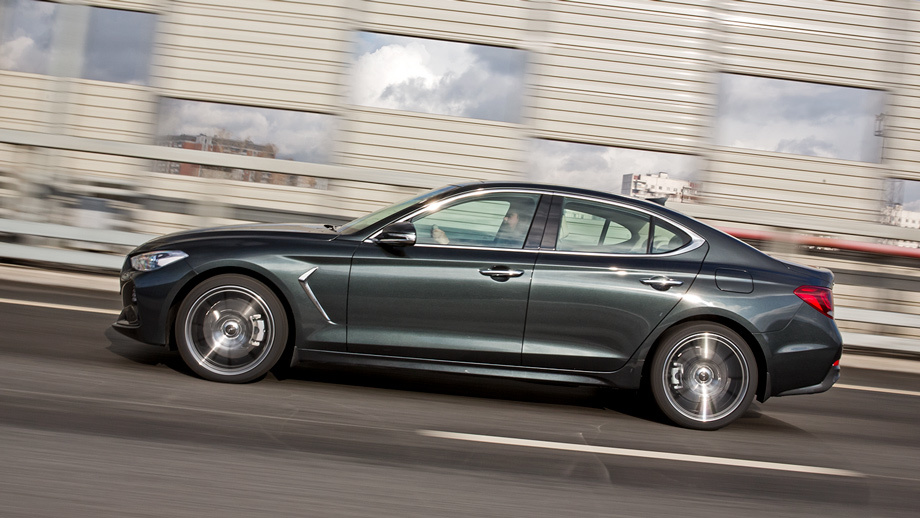
In the first few kilometers, the G70 seems to be the most comfortable car in the trio. It’s quiet in the city if the imitation engine sound through the speakers is turned off (there are even three options!). The suspension with adaptive shock absorbers better absorbs minor road imperfections and sways on waves. On a longer journey, the level of comfort decreases. On the highway, the Genesis fills with aerodynamic noise, not allowing it to be considered quieter than the BMW. Large potholes on regional roads lead to shocks, and there are so many low-frequency body movements that not every vestibular apparatus can withstand them.
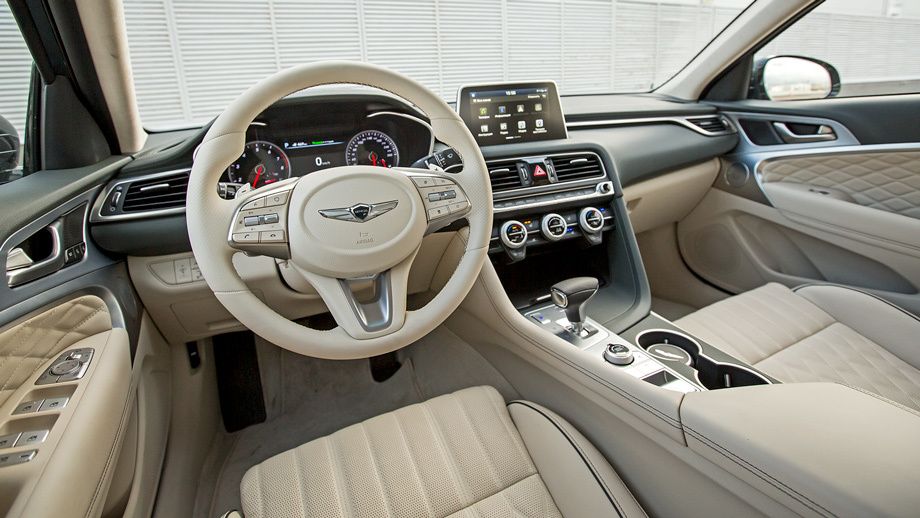
If the Koreans were trying to move into the comfort zone, why does the G70 have such a sharp steering wheel, making 2.3 turns from end to end? You can’t relax on a high-speed highway: you have to continuously control the trajectory, because as soon as you touch the steering wheel, you immediately veer off straight. In addition, the steering wheel suffers from some parasitic moments in uneven turns. Moreover, the rim receives shocks from road irregularities. It’s quite fussy.
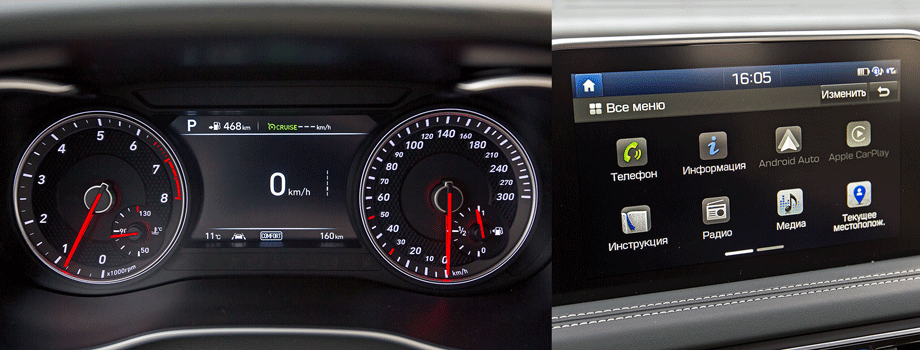
There’s also a lack of harmony in controlling the throttle. Touch the pedal lightly – and off you go! But an attempt to accelerate from movement almost always leads to a delay. The automatic transmission fanatically holds onto higher gears and only shifts down after a pause with a jerk. The stepwise responses to the gas are unpleasant in traffic jams and at high speeds. The car’s ultimate capabilities are modest, even though the G70 is seven horsepower stronger than the Volvo and has fifty more newton-meters of torque. Sport mode is not a panacea: the suspension remains loose, and acceleration control – nonlinear. In addition, every time the car restarts, the mode always resets to Comfort.

There are few obvious advantages — all-wheel drive and a 15-centimeter ground clearance compared to 13-14 cm in competitors. The starting price is attractive, and it’s no coincidence that the lion’s share of demand is for the second-level Elegance trim. Neither BMW nor Volvo can offer anything close in price. There’s no point in paying more for the cramped Genesis, which frantically oscillates between comfort and sport. A large amount, as for the test sample, is unjustified, no matter how good the equipment might be.
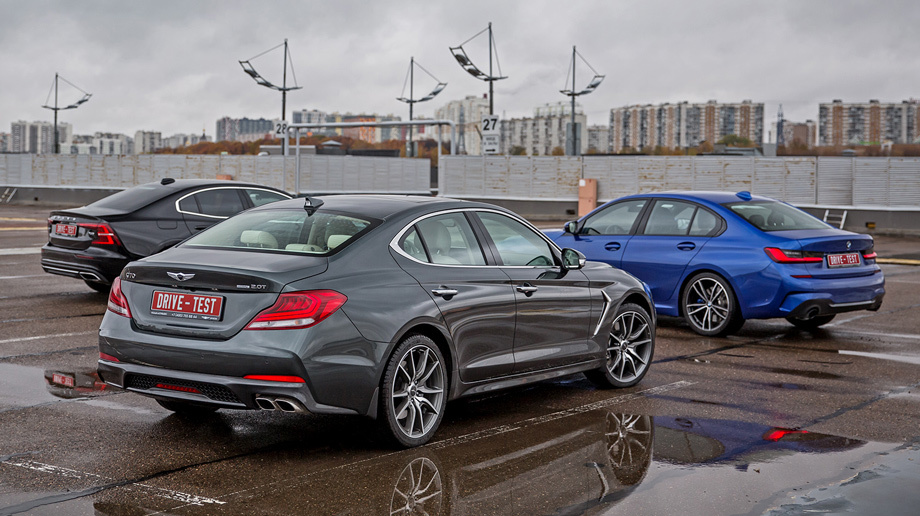
With the BMW, everything is clear: it’s the ultimate choice for a driving enthusiast. Alas, it’s an expensive choice. Even after the test, news came that starting from November production, the 320d version will only be supplied in the all-wheel-drive version xDrive with the M Sport package. The front-wheel drive S60 Inscription is a little cheaper, but considering its rich equipment, it is perplexing not so much because of the price, but because of the departure from many traditionally Volvo values. Subconsciously, you expect silence and a soft ride from a Swedish car, and you find them at best in the Genesis. Strange.
This is a translation. You can read the original here: https://www.drive.ru/test-drive/bmw/genesis/volvo/5db81d8aec05c4195a0000aa.html

